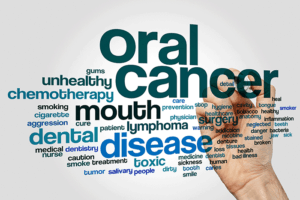Know the Signs of Oral Cancer
Oral cancer, also known as mouth cancer or in some cases oropharyngeal cancer, is as the name suggests a cancer of the mouth or oral cavity. The health issues posed by oral cancer can range from moderate to severe, depending on the kind of cancer and when it is detected and treated. While each of us is unlikely to develop oral cancer, it is on the rise in the US, with reported cases increasing by 6% over the last several years. We all must know the signs of oral cancer so that if we encounter them we can seek treatment promptly. Likewise, we need to know the causes of oral cancer–many of the risk factors are behavior-based and thus avoidable. If we know the signs of oral cancer and a bit about what causes it, we can take the appropriate action if necessary.
What is Oral Cancer?
Oral cancer occurs when cells in the tissues of the mouth, lips, or gums develop unexpected changes in their DNA. These changes, called mutations, lead to the growth of abnormal cells which can, in turn, develop into a clump called a tumor. Some tumors are harmless–benign tumors–and others are harmful, or malignant. Given time, malignant tumors can spread to other parts of the body causing illness or even death. Oral cancers are most likely to begin in the thin flat squamous cells which line the lips and the inside of the cheeks. This kind of tumor is called squamous cell carcinoma.
What are the Signs of Oral Cancer?
Oral cancer most often manifests as a lesion that won’t heal, or a lump or bump inside the mouth. However there are a variety of symptoms and signs that indicate oral cancer may be present, and these include the following:
- A sore or lesion in the mouth that doesn’t heal. This is the most common symptom, and if detected you should seek medical care.
- Pain in the mouth that doesn’t go away. This may be related to the sore or lesion or it may occur independently.
- A lump or thickening in the cheek, gum, or tongue.
- A persistent white or red patch on the gums, tongue, tonsil, or lining of the mouth
- A persistent sore throat or a feeling that something is caught in the throat.
- Difficulty chewing or swallowing
- Difficulty moving the jaw or tongue
- Numbness of the tongue or other area of the mouth
- Swelling of the jaw that causes dentures to fit poorly or become uncomfortable
- Loosening of the teeth or pain around the teeth or jaw
- Changes in the voice or difficulty speaking
- A lump or mass in the neck
- Weight loss
- Constant bad breath
If any of these symptoms recur or persist, it’s time to bring the matter to the attention of your dentist or doctor. They’ll know what to look for and how to suggest a course of treatment.
What Causes Oral Cancer
As with most cancers, the root causes of oral cancer are not fully understood. However, several risk factors increase the odds of oral cancer developing:
- Tobacco use of any kind, including cigarettes, cigars, pipes, chewing tobacco, and snuff, among others
- Heavy or excessive alcohol use
- Excessive sun exposure to your lips
- A sexually transmitted virus called human papillomavirus (HPV), which has been linked to several forms of cancer
- A weakened immune system
By moderating or avoiding the use of alcohol and tobacco, taking care to avoid excess sun exposure, and cultivating general health, we can lower our risk of oral cancers and improve oral health overall.
Oral cancer is something to be aware of, and by knowing the signs of oral cancer you’ll be better equipped to detect it early should the worst occur. Taking care of your health, brush, and floss regularly, and should you notice any of the symptoms outlined above contact your dentist or doctor.
